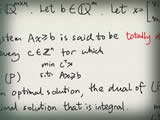cuOpen currently provides access to a handful of open educational resources that you can adopt and adapt for your own use.
- R for Biologists
- Fundamentals of Polyhedral Combinatorics
- How to Succeed in an Online Course
- Children’s Rights
- Physics Education Modules for Non-Science Majors (OPEM)
- Laws of Nature through the Lens of Physics and Chemistry
R for Biologists
 R is a free (open source) object-oriented programming language and software environment for statistical computing and graphics that is rapidly becoming the lingua franca of researchers in many disciplines. As the single most important tool for statistics, visualization and data science in the world, students with training in R are increasingly sought after by academia and industry.
R is a free (open source) object-oriented programming language and software environment for statistical computing and graphics that is rapidly becoming the lingua franca of researchers in many disciplines. As the single most important tool for statistics, visualization and data science in the world, students with training in R are increasingly sought after by academia and industry.
R for Biologists is a suite of online resources designed to help introduce R programming for those who want to use it for data handling, statistics or modelling. The modules are further broken down into 10-12 stand alone components which concentrate on a specific aspect of R programming.
The resources provided are not designed to replace face-to-face teaching, but to complement it by introducing the theory (typically videos of PowerPoint presentations), the practice (typically videos of writing code in RStudio) and the code (developed using RMarkdown/knitR) associated with a particular concept or approach. Short multiple choice exercises are provided at the end of each component, while longer multiple-choice exams are available to fully test understanding.
Upon successful completion of R LABS (3 modules), students will be able to:
- Manipulate data as vectors, matrices and data frames
- Plot data in an informative way
- Apply classical statistical methods to test null hypotheses
- Simulate continuous and discrete time dynamics
Click here to see the course on eCarleton.
Fundamentals for Polyhedral Combinatorics
 This series of five modules serves as an introduction to the fundamentals of polyhedral combinatorics and some basic applications. Topics covered include core results in linear programming, convexity, polyhedra, affine subspaces, dimensions, faces, facets, integral polyhedra, and applications.
This series of five modules serves as an introduction to the fundamentals of polyhedral combinatorics and some basic applications. Topics covered include core results in linear programming, convexity, polyhedra, affine subspaces, dimensions, faces, facets, integral polyhedra, and applications.
Specifically, the individual modules cover linear programming basics, convex sets and polyhedra, faces and facets, integral polyhedra, and applications.
Upon successful completion of the modules, students will be able to:
- Discuss fundamental concepts in polyhedral combinatorics
- Identify structural properties of polyhedra
- Apply polyhedral techniques to simple combinatorial optimization problems
Click here to see the course on eCarleton.
How to Succeed in an Online Course
 Increasingly students in Ontario (and beyond) are enrolling in online courses, but they often don’t have the necessary skills to be successful in this learning environment. How to Succeed in an Online Course consists of eight modules, with the goal of helping students to prepare to take an online course, improve their learning strategies in an online environment, and familiarize themselves with skills to succeed in learning online.
Increasingly students in Ontario (and beyond) are enrolling in online courses, but they often don’t have the necessary skills to be successful in this learning environment. How to Succeed in an Online Course consists of eight modules, with the goal of helping students to prepare to take an online course, improve their learning strategies in an online environment, and familiarize themselves with skills to succeed in learning online.
Upon successful completion of all modules, students will be able to:
- Evaluate their readiness to take an online course
- Recognize learning habits and techniques to help with taking online courses
- Develop basic time management skills to schedule the components of an online course successfully
- Recall the basic key attributes of human learning, memory, and meta-cognition to improve learning outcomes in all university courses
- Recognize the differences between traditional classroom and online courses in order to increase chances of success
Click here to see the course on eCarleton.
Children’s Rights
 This series of interdisciplinary modules is designed to be used as part of a course or for self-study under the guidance of an expert in the field. They introduce students to key issues, questions and debates in Children’s Rights scholarship and research. The modules are organized around the three key tenets that frame the United Nations Convention on the Rights of the Child (UN CRC): protection, provision and participation rights. Given the interdisciplinary focus of each module in the series, each one can potentially be utilized within a wide range of courses, programs and institutions.
This series of interdisciplinary modules is designed to be used as part of a course or for self-study under the guidance of an expert in the field. They introduce students to key issues, questions and debates in Children’s Rights scholarship and research. The modules are organized around the three key tenets that frame the United Nations Convention on the Rights of the Child (UN CRC): protection, provision and participation rights. Given the interdisciplinary focus of each module in the series, each one can potentially be utilized within a wide range of courses, programs and institutions.
What makes these modules unique is that they provide an insight from the Honourable Landon Pearson, who shares her experience as the former “Children’s Senator” and one of Canada’s foremost advocates on children’s rights. Materials used in the modules are drawn from Pearson’s personal library on children’s rights containing over 10,000 documents amassed over the past 50 years that now reside at the Landon Pearson Resource Centre for the Study of Childhood and Children’s Rights (LPRC) at Carleton University.
Click here to see the course on eCarleton.
Open Physics Education Modules for Non-Science Majors (OPEM)
 Physics has had a profound influence on music, philosophy, literature, film and art. The open Physics Education Modules for Non-Science Majors is a set of modules that serve as a first-year introductory physics course for non-science students. The structure and content of some modules or topics can also serve as supplementary materials for upper-year non-science majors. This set of modules allows students to explore the interaction between physics and culture in the broadest sense. Students learn the physics behind everyday objects and the basis for the physical and technological world in a conceptual, non-technical manner. The modules cover the following thematic topics: transportation, sports, weather, home electricity, sound and music, light and colour, green energy, medical imaging, the Galaxy and the developments in recent technologies like the cell phone. Video lessons, activities and assessments are included in the modules.These modules have been produced with the assistance of eCampus Ontario.
Physics has had a profound influence on music, philosophy, literature, film and art. The open Physics Education Modules for Non-Science Majors is a set of modules that serve as a first-year introductory physics course for non-science students. The structure and content of some modules or topics can also serve as supplementary materials for upper-year non-science majors. This set of modules allows students to explore the interaction between physics and culture in the broadest sense. Students learn the physics behind everyday objects and the basis for the physical and technological world in a conceptual, non-technical manner. The modules cover the following thematic topics: transportation, sports, weather, home electricity, sound and music, light and colour, green energy, medical imaging, the Galaxy and the developments in recent technologies like the cell phone. Video lessons, activities and assessments are included in the modules.These modules have been produced with the assistance of eCampus Ontario.
Click here to see the course on eCarleton.
The Laws of Nature through the Lens of Physics and Chemistry

Six open modules that tackle current, relevant topics related to physical and chemical principles that help us understand the environmental issues of today. The modules examine how science can both broaden and focus our understanding of the impacts of obtaining, transmitting and using energy in a technological world. The modules topics include the topics of Motion, Heat, Atoms and Reactions and Electricity. Video lessons are followed by suggestions for activities and assessments as well as interviews and conversations with experts in the field. These modules have been produced with the assistance of eCampus Ontario.